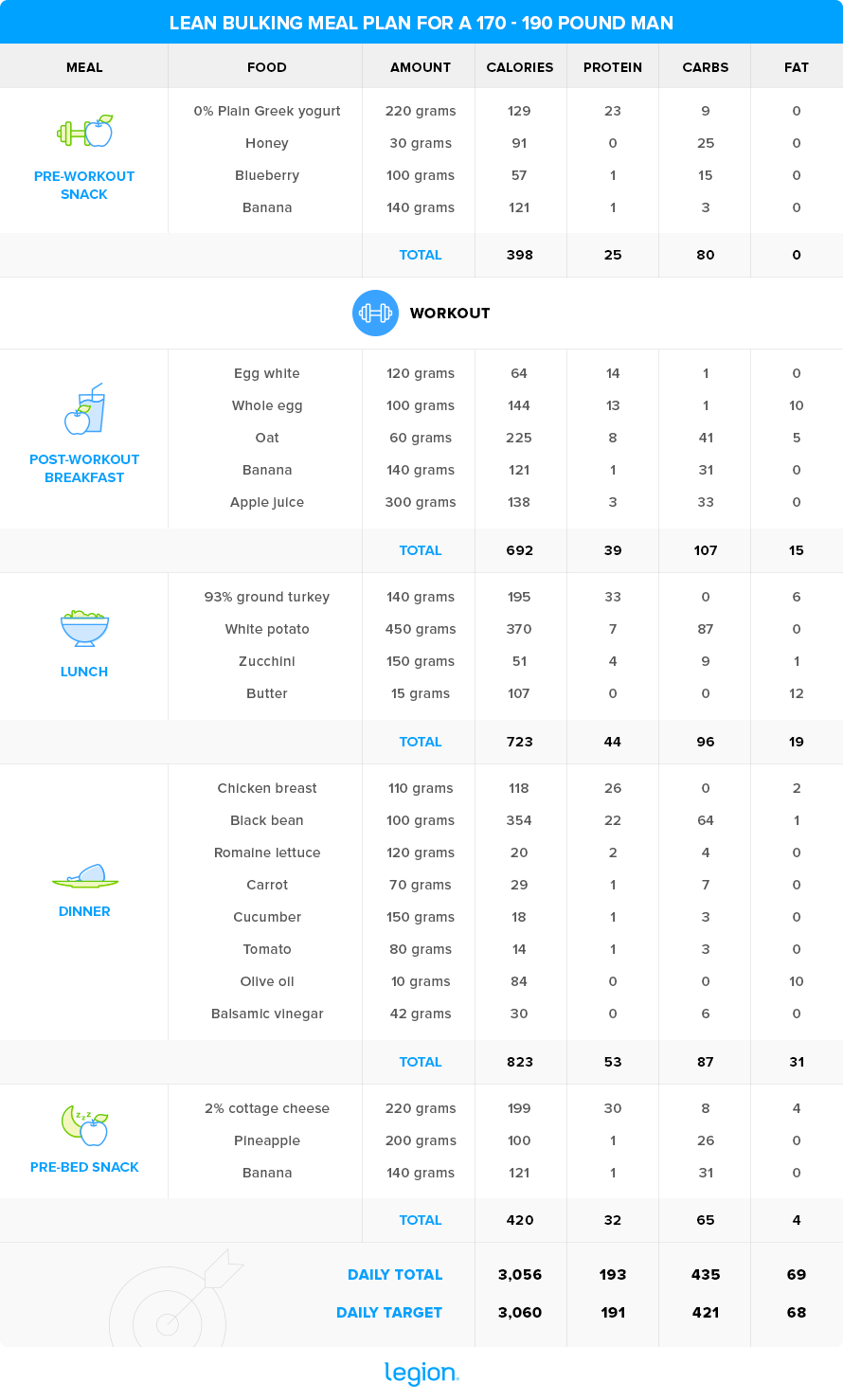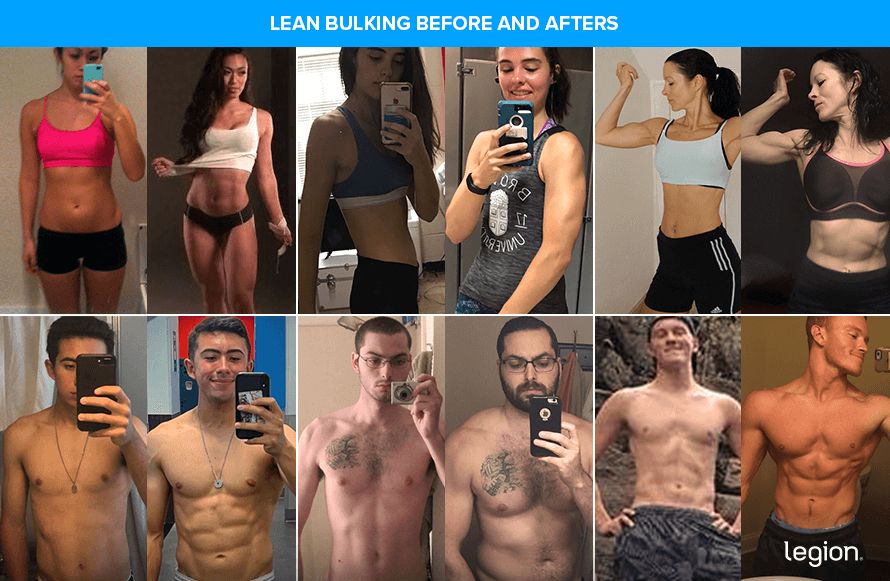Most gym-goers know that to build muscle and gain strength, you need to “bulk.”
Most also realize this will make them gain body fat.
And it’s here that many shy away from bulking.
Luckily, it’s possible to bulk without screwing up your body composition if you know what you’re doing.
The “secret?”
Lean bulking.
In this article, you’ll learn what lean bulking is and how to lean bulk correctly, including how to calculate your lean bulk calories and macros, what foods to include in your diet for lean bulking, what a good lean bulking meal plan looks like, how to use a lean bulk calculator, and more!
Want to know exactly what diet to follow to reach your fitness goals? Take our free 60-second quiz and find out now.
Key Takeaways
- A lean bulk is a dieting strategy that helps you build muscle while minimizing excess fat gain.
- To lean bulk effectively, eat about 10% more calories than you burn and get 0.8-to-1 gram of protein per pound of body weight daily.
- Most of your calories should come from whole, minimally processed foods.
- Strength training is essential during a lean bulk to ensure the extra calories you eat go toward gaining muscle.
- To maximize your lean bulking results, consider using a high-quality protein powder to help you reach your daily protein target, creatine to support recovery and muscle growth, and a pre-workout to enhance energy, focus, and performance.
Table of Contents
+
What Is a Lean Bulk?
A “lean bulk” refers to a diet strategy where you aim to gain muscle while minimizing fat gain. You achieve this by tightly regulating your macronutrient and calorie intake to ensure you “grease the skids” of muscle-building without gaining excess body fat.
Lean bulking (or “clean bulking”) contrasts with traditional bulking (or “dirty bulking”), where you create a large caloric surplus to gain weight as quickly as possible, resulting in both muscle and fat gain.
How to Lean Bulk
To lean bulk correctly, you must calculate your lean bulk calories and macros. I’m going to show you exactly how in a moment, but if you’d prefer to skip all the number crunching, take the Legion Diet Quiz instead.
All you have to do is answer 9 simple questions, and in just 60 seconds, you’ll learn exactly how many calories, how much of each macronutrient, and which foods you should eat to lean bulk successfully. Take our online diet quiz today to find your new science-based diet.
Or, if you’d like to learn more about the methodology behind this quiz and do the math yourself, read on!
Calculate Your Lean Bulk Calories
To maximize muscle gain while minimizing fat gain, eat around 110% of your total daily energy expenditure (TDEE). For most people, this means consuming 16-to-18 calories per pound of body weight daily.
More specifically . . .
- If you’re lightly active (1-to-3 hours of exercise or vigorous activity per week), start with 16 (and try to do at least three strength training workouts per week).
- If you’re moderately active (5 or more hours of exercise or vigorous activity per week), go with 17, and then if you aren’t steadily gaining weight and strength, move up to 18.
- If you’re highly active (7-to-10+ hours of exercise or vigorous activity per week), use this total daily energy expenditure calculator to determine how many calories you should eat when lean bulking.
If you’re sedentary (no exercise or vigorous activity), you shouldn’t be lean gaining because extra calories without resistance training just makes you fatter.
Calculate Your Lean Bulk Macros
In addition to eating enough calories, it’s also vital that you balance your fat, carbohydrate, and protein intake (“macros”) while leaning bulking.
Here’s how to calculate your macros for a lean bulk:
- Protein: Eating 0.8-to-1 gram of protein per pound of body weight per day is enough to maximize muscle growth. Eating more won’t help you bulk up faster, though some evidence suggests eating 1.5-to-2 grams per pound while bulking may help minimize fat gain. This usually works out to around 20-to-30% of calories for most people.
- Fat: Eat around 20-to-30% of your calories from fat. This is enough to optimize health and add flavor to your lean bulk meals while leaving plenty of room for protein and carbs.
- Carbs: Get the rest of your calories (~40-to-60%) from carbs. You want to follow a high-carb diet while lean bulking because this keeps your glycogen levels topped off, improving your performance in the gym and positively impacting genes related to muscle growth.
FAQ #1: What are the best lean bulk foods?
One of the best ways to stick to your lean bulk diet plan is to stock up on your favorite lean bulking foods, so you’ve always got something to hand come mealtime. Here are some of my favorites:
Lean Proteins for Bulking
- Sirloin steak
- Ground beef
- Pork tenderloin
- Chicken breast
- Seafood (especially low-fat fish like tilapia, cod, catfish, etc.)
- Egg whites
- Chickpeas
- Greek yogurt or Skyr
- Cottage cheese
- Low-fat milk
Healthy Carbs for Bulking
- Quinoa
- White or brown rice
- Sweet potatoes
- Whole grain pasta
- Ezekiel bread
- Potatoes
- Oats
- Granola
- Broccoli
- Spinach
Healthy Fats for Bulking
- Avocados
- Whole eggs
- Olive oil
- Almonds or almond butter
- Peanuts or peanut butter
- Pistachios
- Coconut oil
- Walnuts
- Chia seeds
- Cashews
FAQ #2: What’s the best lean bulk calculator?
A lean bulk calculator is a macronutrient calculator configured to calculate your macros for lean bulking.
You can change the Legion Macronutrient Calculator into a lean bulking calculator by inputting your data and then selecting “Moderate weight gain (1% of body weight per month)” or “Rapid weight gain (2% of body weight per month)” from the “Goal” dropdown box.
FAQ #3: What’s the best clean bulk meal plan?
There’s no such thing as the “best” clean bulk meal plan because everyone’s calorie and macronutrient needs are different.
That said, to lean bulk successfully, your lean bulk meals should . . .
- Put you in a daily calorie surplus of around 10%
- Primarily comprise whole, nutritious, minimally processed foods
Here’s an example of how that might look for a 180-pound man:

FAQ #4: What’s the best lean bulk workout plan?
If you want a lean bulk workout plan specifically designed to work with the bulking information in this article, check out the workout plans in my best-selling fitness books Bigger Leaner Stronger for men, and Thinner Leaner Stronger for women.
FAQ #5: What does a successful lean bulk before and after look like?
If you want to see significant results from lean bulking, you need to do it more than once.
That is, you’ll need to alternate between lean bulking phases, where you focus on adding muscle mass to your frame (along with some fat) and cutting phases to strip away any extra fat while retaining your newly gained muscle.
This is the method I teach in my fitness books Bigger Leaner Stronger for men, and Thinner Leaner Stronger for women, and it’s the method these folks used to dramatically change their bodies over the course of 12 months:

FAQ #6: Does a lean bulk lose fat?
Most people won’t lose fat during a lean bulk. During a lean bulk, the primary focus is on muscle gain while minimizing fat gain.
The one exception is if you’re a beginner weightlifter. Novices may be able to lose fat while bulking (achieve “body recomposition”) thanks to a phenomenon known as “newbie gains.” However, if you’ve been training for over a year, maintaining a calorie surplus, regardless of how constrained it is, will result in some fat gain.
Nonetheless, the primary goal of lean bulking is muscle gain, not fat loss.
FAQ #7: Should I be doing cardio during a lean bulk?
Doing cardio while bulking is beneficial because it can enhance recovery, improve your body’s metabolic responses to food, and keep you well-conditioned.
For best results . . .
- Do at least two low- to moderate-intensity cardio workouts per week of 20-to-60 minutes each.
- Do one HIIT workout weekly if you enjoy it.
- Limit total cardio to 2-to-3 hours weekly.
- Do cardio and weightlifting on separate days. If that’s not possible, lift weights first and separate the workouts by at least six hours.
And if you want to learn more about the relationship between cardio and muscle growth, check out this article:
Cardio and Muscle Growth: Friends or Foes?
FAQ #8: What supplements can help during lean bulking?
The best supplements for maximizing your lean bulking results are:
- Protein powder: Protein powder, such as whey or casein, provides your body with the nutrients needed to build muscle tissue and recover from workouts. For a clean and delicious protein powder, try Whey+ or Casein+.
- Creatine: Creatine boosts muscle and strength gain, improves anaerobic endurance, and reduces muscle damage and soreness from your workouts. For a natural source of creatine, try our creatine monohydrate, creatine gummies, or Recharge.
- Pre-workout: A high-quality pre-workout enhances energy, mood, and focus, increases strength and endurance, and reduces fatigue. For a top-tier pre-workout containing clinically effective doses of 6 science-backed ingredients, try Pulse with caffeine or without.
(If you’d like even more specific advice about which supplements you should take to reach your health and fitness goals, take the Legion Supplement Finder Quiz, and in less than a minute, you’ll know exactly what supplements are right for you.)
Scientific References +
- Antonio, Jose, et al. “The Effects of Consuming a High Protein Diet (4.4 G/Kg/D) on Body Composition in Resistance-Trained Individuals.” Journal of the International Society of Sports Nutrition, vol. 11, no. 1, 12 May 2014, https://doi.org/10.1186/1550-2783-11-19.
- Antonio, Jose, et al. “A High Protein Diet (3.4 G/Kg/D) Combined with a Heavy Resistance Training Program Improves Body Composition in Healthy Trained Men and Women – a Follow-up Investigation.” Journal of the International Society of Sports Nutrition, vol. 12, no. 1, 20 Oct. 2015, https://doi.org/10.1186/s12970-015-0100-0.
- Coyle, E F. “Substrate Utilization during Exercise in Active People.” The American Journal of Clinical Nutrition, vol. 61, no. 4, 1 Apr. 1995, pp. 968S979S, https://doi.org/10.1093/ajcn/61.4.968s.
- Stokes, Tanner, et al. “Recent Perspectives Regarding the Role of Dietary Protein for the Promotion of Muscle Hypertrophy with Resistance Exercise Training.” Nutrients, vol. 10, no. 2, 7 Feb. 2018, p. 180, www.mdpi.com/2072-6643/10/2/180/pdf, https://doi.org/10.3390/nu10020180.
- Jd, Branch. “Effect of Creatine Supplementation on Body Composition and Performance: A Meta-Analysis.” International Journal of Sport Nutrition and Exercise Metabolism, 1 June 2003, pubmed.ncbi.nlm.nih.gov/12945830/.
- Eckerson, Joan M., et al. “Effect of Creatine Phosphate Supplementation on Anaerobic Working Capacity and Body Weight after Two and Six Days of Loading in Men and Women.” The Journal of Strength and Conditioning Research, vol. 19, no. 4, 2005, p. 756, https://doi.org/10.1519/r-16924.1.
- Bassit, Reinaldo Abunasser, et al. “Effect of Short-Term Creatine Supplementation on Markers of Skeletal Muscle Damage after Strenuous Contractile Activity.” European Journal of Applied Physiology, vol. 108, no. 5, 3 Dec. 2009, pp. 945–955, https://doi.org/10.1007/s00421-009-1305-1.










